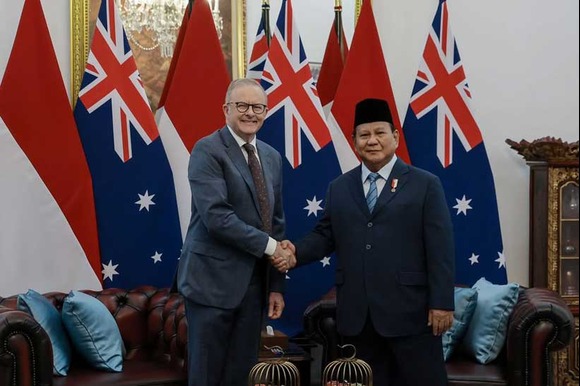Australia and Indonesia have announced they are nearing the signing of what both nations describe as a “watershed” defence treaty that will significantly enhance their long-standing cooperation on regional security and stability.
The agreement, approved on Wednesday by Australian Prime Minister Anthony Albanese and Indonesian President Prabowo Subianto—who is making his first state visit to Australia—represents a major upgrade in strategic relations between the two neighbours. While the pact has received full approval from both governments, it will not be formally signed until January.
Under the proposed treaty, the two countries will pledge to consult regularly at the leader and ministerial levels on key matters of security. The agreement will also provide a framework for joint and mutually beneficial defence activities, and commit both sides to consult and consider collective or individual action if either nation’s security is threatened, according to Prime Minister Albanese.
“This treaty is a recognition by both our nations that the most effective way to secure peace and stability in our region is through cooperation,” Albanese said. “It signals a new era in the Australia–Indonesia relationship,” he added, describing it as a commitment to “close collaboration in the defence and security field.”
President Prabowo echoed those sentiments, saying, “Good neighbours help each other in times of difficulty.” Drawing on a local proverb, he noted, “In Indonesian culture, we say that when we face an emergency, it is our neighbour who will come to our aid.”
Although the full text of the treaty has not yet been released, Albanese said it is modelled on the 1995 security agreement signed by then–Prime Minister Paul Keating and President Soeharto, which laid the groundwork for regional cooperation before being scrapped. That earlier agreement was terminated by Indonesia following Australia’s involvement in a UN peacekeeping mission in East Timor, then an Indonesian-occupied territory.
Since East Timor gained independence in 2002, relations between Jakarta and Canberra have steadily improved. The two countries have since signed several key defence frameworks, including the 2006 Lombok Treaty and the 2024 Defence Cooperation Agreement, both of which form the foundation for the current pact.
The new agreement builds on these earlier arrangements, reaffirming that both countries will consult each other if one or both perceive a security threat, and will jointly decide on possible measures to address it—either independently or together.
Both nations share deep-seated concerns about China’s growing influence in the region. While Beijing remains a crucial economic partner, it is also viewed as a strategic rival with increasing military presence across the South China Sea and the Pacific.
Former Australian Prime Minister Paul Keating reflected on these dynamics in a recent interview with ABC News, recalling his earlier partnership with Soeharto. “Soeharto and my arrangement was essentially a mutual defence pact,” Keating said. “Because a major threat to one—given the geography—necessarily impacted the other or had consequences for the other.”
Keating noted that both he and Soeharto had been concerned about China’s rise even three decades ago. “Soeharto was deeply worried about Indonesia’s ability to defend its vast archipelago against a capable military force,” he said. “And I shared those concerns.”
With this new treaty, Australia and Indonesia appear determined to strengthen their mutual security architecture, signalling a unified approach to regional defence challenges while reaffirming the importance of partnership, dialogue, and shared responsibility in maintaining Indo-Pacific stability.






